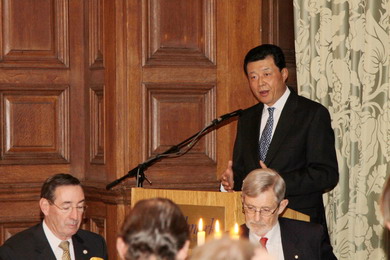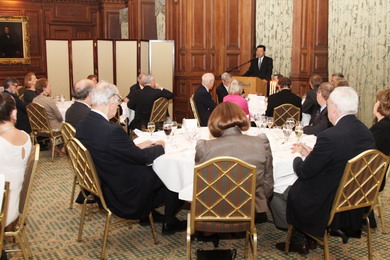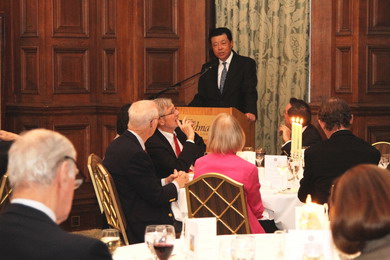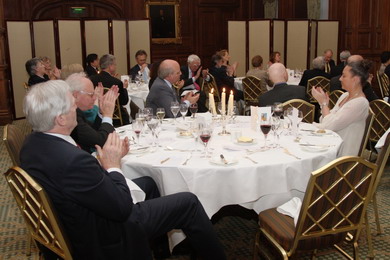|
(5th May 2011, Landmark Hotel, London)

Sir Paul Judge,
Ladies and gentlemen,
It is a great pleasure for me to attend this dinner hosted by the British North-American Committee.
I am delighted to further appreciate the wide interests and generousity of your Chairman and host, Sir Paul Judge.
Sir Paul is the principal benefactor of the Judge Business School at the University of Cambridge. And I had the honour to speak at the Judge Business School in February. In this sense, I should thank Sir Paul for hosting me twice.
To be frank, my first thought as Ambassador of China in the UK was of surprise to be invited to speak at your forum linking interests across the Atlantic Ocean, rather than the Pacific Ocean.
But then I recognised how your Committee was showing long-range vision in seeking to create broader understanding of the world beyond the shores of the Atlantic Ocean.
Furthermore, I was told that it was the changes of China that I was invited by your committee to speak to you this evening. This is a hot topic in the world today and falls within my responsibility as Chinese ambassador to address. That was why I am very pleased to respond with my views about 'China's Place in the World'.
As I have said, your British - North America Committee is clearly enlightened about this profound change in China in the past three decades.
But reading and watching the media in Britain and North America it is a tough challenge to learn about the comprehensive changes in China.
Before we discuss China's place in the world, let me first pose you three questions. These are the questions:
-
Who is the largest contributor to world economic growth?
-
Who is the largest contributor of peacekeepers among the five permanent members of the UN Security Council?
-
And who is investing more than anybody else in clean energy?
Let these figures speak for themselves about the answer of China to all three questions.
According to a Goldman Sachs report, the decade from 2000 to 2009 saw China contribute more than 20% of the world GDP growth. This is a little higher than the United States and three times that of the Euro Zone. This Chinese economic growth contribution soared to over 50% in 2009 when the international financial crisis was at its worst.
China first took part in a UN mission in 1990. Since then China has sent more than 17,000 personnel on 19 UN peacekeeping missions. That is more than any other UN Security Council permanent member. As we speak now, more than 2,000 Chinese nationals are performing duties in 9 peacekeeping tasks around the world.
In 2010 the highly authoritative US Pew Trusts published 'Who's Winning the Clean Energy Race'. This shows that China took the lead in overall clean energy financing and investment in 2010: the total investment was 54.4 billion US dollars. That is 1.3 times that of Germany, 1.6 times the United States. Germany and the USA rank second and third respectively on the list.

These figures point to three facts.
The first fact: China is an engine for world economic growth.
In the 32 years of reform and opening-up China has managed double-digit growth every year. The result is China is now the world's second largest economy.
By developing my country in an increasingly open and cooperative way, China expects the world to benefit from its development.
As the leading global exporter, China's affordable exports have already helped improve people's lives all over the world.
Huge benefits accrue to the world from China ranking as the number two importer. China is a vast market for technologies, high-end products, innovations, minerals, resources and energy from developed and developing countries.
Take Canada for example. Canadian exports to China quadrupled over the past decade. China now ranks as Canada's number three export destination, after only the United States and Britain.
With a total foreign investment of more than a trillion US dollars, China is the second largest destination of foreign investment in the world. China ranks number one among developing countries in attracting foreign investment.
As China develops, foreign businesses are growing in strength in China with attractive profit margins. Take the western automobile industry as an example: this has benefited a great deal from investing in China.
Volkswagen was the most profitable automaker in 2010 with a total profit of 7.1 billion euros, of which at least 2 billion came from the Chinese market.
General Motors had to be bailed out by the US Government in 2008. It last made a profit in 2004. But in 2010 General Motors returned to profit partly thanks to the quickly expanding Chinese market. General Motors' sales in China increased nearly 29% in 2010 while its US sales rose just 6%. Last year General Motors sold more vehicles in China than the USA.
In recent years, China has been shifting to create a balance between inbound and outbound investment. China made a direct investment of 59 billion US dollars in 129 countries and regions in 2010. Chinese investment has proven good for local economic growth and job creation. In 2009, Chinese companies overseas submitted 10.9 billion US dollars in taxes to their host countries and hired a local workforce of 438,000 people.
There is an excellent recent example in the UK auto industry in Birmingham.
A few weeks ago I attended the launch of the new MG6 model at the famous Longbridge Plant in Birmingham. This MG6 is the first car produced at Longbridge in 16 years. It was also the first car designed, developed and built in the UK by SAIC, the Shanghai Automotive Industry Corporation, since its acquisition of MG 6 years ago. SAIC strategy draws on the global lead Britain enjoys in automotive engineering and design. The MG6 concept of 'designed in the UK, produced in China and assembled in the UK', enables the MG to retain its almost 90 year-brand and 'Made in the UK' tradition. It also helped to create 400 jobs for the local people, with the prospect of more jobs created in sales, maintenance and services. The MG6 in every way adds up to success for China, a winner for the UK and a tour de force for co-operation between Britain and China.
I now turn to the second fact reflecting the theme of 'China's place in the world today'. This fact is about China as an important force for world peace and stability.
There is an ancient Chinese saying that translates as: 'peace is most precious' and 'the use of force is undesirable'. These sayings are deeply rooted in how China formulates and practices its foreign policies.
China was the first country to propose the 'Five Principles of Peaceful Coexistence' that arose out of dialogue between China and India in 1954.
China is a faithful follower of the Charter of the United Nations. China is consistently opposed to the use of force in international relations, stands for non-interference in others' internal affairs and supports peaceful, negotiated solutions to international disputes. China has solemnly proclaimed to the world that it would never seek hegemony or expansion.
China sent escort ships to the waters off the Somali coast. The decision followed a UN Security Council resolution in December 2008. The mandate was to fight piracy and so try and maintain the safety of international waters.
I served as the Chinese Ambassador in the Democratic People's Republic of Korea for three and a half years before coming to Britain. While I was in Pyongyang the situation on the Korean Peninsula was extremely tense. China's active mediation was the crucial catalyst that enabled the 'Six Party Talks' to be effective. This defused a crisis in the region and made a peaceful resolution possible. China is equally committed to peace and negotiations on the Iranian nuclear issue.
My country has been calling for an immediate ceasefire of all parties in Libya and effort for a peaceful resolution. This will help return Libya to stability as soon as possible and avoid further civilian casualties.

Now for the third fact reflecting the theme of 'China's place in the world today': China as a responsible player in meeting global challenges.
We live in a globalised world. The new infrastructures of air travel and digital tools shrink distances in a way that would have been unimaginable even 50 years ago.
This globalised world also means we face issues that can only be resolved through global collaboration. Only through working together can we win a sustainable future on such major challenges as world financial stability, nuclear issues, food security and climate change.
On climate change, China is serious about its pledge that energy intensity will be cut by 40-45% by 2020. The recently adopted 12th Five-Year Plan also set many mandatory targets. These will be translated to specific measures China will take to meet climate change:
-
Reducing energy and carbon dioxide intensities by 16% and 17% respectively.
-
Cutting the discharge of main pollutants by 8-10%.
-
Increasing forest coverage to over 21%.
On energy, China is both a major consumer and producer. China follows clear principles on energy development. This has these features:
-
Conservation comes first.
-
A stress on clean energy.
-
Reliance on domestic production.
-
Scientific advancement.
-
Diverse sources of energy.
-
And environmental protection.
China will not consume energy that goes beyond the needs of its population. Also, China has made it very clear it has no wish to catch up with developed countries in terms of per capita energy consumption.
Another aspect of global collaboration is the UN Millennium Development Goals: this was to achieve anti-poverty goals by 2015.
China has much experience to share in reducing poverty. Since 1978, 200 million Chinese people have been lifted out of poverty. So China is using this experience to help other nations.
Another way China helps is with debt: China has cancelled 2.56 billion pounds worth of debts owed by 50 Less Developed Countries and Heavily Indebted Poor Countries.
For those who read the Financial Times, you may have learnt that China has given record loans of 110 billion US dollars to other developing countries in the past two years. That is a higher figure than the World Bank.
The recent rise in global commodity prices is a stark reminder about the need for global collaboration on food security.
Chinese agricultural efficiency is making a profound contribution to global food security by feeding 22% of the global population from 10% of the world's arable land.
China is an example of self sufficiency in food production. Imagine, what impact it will have on food prices in the world if China has to rely on the import of food to feed its people.
Ladies and gentlemen,
The late US President Franklin Roosevelt once predicted in the 1940s that in 40 or 50 years' time China might easily become a powerful nation. His prediction has come true today. And may I add that China is not only a powerful nation, but also a nation committed to peaceful development and mutual benefit. It is also a responsible and trustworthy player in the international system.
Thank you. And I will be happy to take your questions.

※ ※ ※
Founded in 1969, the British – North American Committee is a group of leaders from political, business and academic communities in the UK, the United States and Canada, committed to harmonious, constructive relations among the three countries. It meets every May in the UK and every October in the United States or Canada to discuss issues of shared interest with invited experts and senior policymakers. Ambassador Liu Xiaoming was invited by the Committee's UK Chairman Sir Paul Judge to deliver the above keynote speech on "China's place in the world". Ambassador Liu also answered questions on China's urbanisation, population policy and its relations with the UK and Canada.
|

